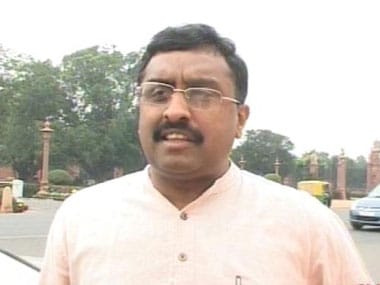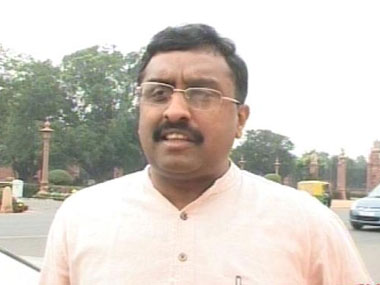By making a ‘profound’ statement on the concept of Akhand Bharat and choosing the absolutely wrong time for it, Ram Madhav has undermined his position within the BJP and the RSS, at least for now. Though he has clarified that his interview to Al Jazeera news channel was given much earlier and was broadcast a day after Prime Minister Narendra Modi made a surprise visit to Pakistan for a brief meeting with his counterpart Nawaz Sharif, it has not cut much ice with his peers in the party and its ideological fountainhead. “He (Madhav) should realise that he holds a very responsible position in the ruling party and should refrain from making contrarian remarks on subjects where the government’s position is well-known,” a party general secretary told Firstpost. Another leader said that Ram Madhav should by now know that PM Modi, also the supreme leader of the party, makes big bold surprise moves with regard to Pakistan, other SAARC countries and the supposed superpowers. Thus, he should be doubly cautious in what he says before domestic or foreign media, the leader said. [caption id=“attachment_2562922” align=“alignleft” width=“380”]
 File photo. Image courtesy: ibnlive[/caption] The fact that official spokespersons of the RSS and the BJP have publicly distanced themselves from his comment on Akhand Bharat is an indication of the emerging situation for him. “He should have been careful… It’s for everyone to see. He needs to think on the subject (which is hogging the limelight),” a party leader requesting anonymity said. Till recently, Madhav was taken to be the most important general secretary in the party, the only office-bearer in his rank who didn’t have any direct responsibility of managing organisational affairs in any state or other sundry office work. He did handle Jammu and Kashmir but that was more of an informal supervisory authority than part of a specific work allocation. He enjoyed total confidence of the party president Amit Shah and Prime Minister Modi. Though he is a new entrant (from RSS), his perceived authority and aura outshone that of his peers in the party’s national office-bearers’ team. The fact that he formed an “advance party” for the prime minister’s foreign trips, seen all over during live broadcasts of those trips, and that he was credited with mega NRI shows abroad gave him such instant aura. Subsequently, some tier three and four leaders in the BJP had started suggesting that he could be the “future” of the party, comparing his rise with Modi’s rise. His RSS pracharak background was flaunted, like that of Modi. But long-term predictions in politics are always fraught with risks. Lately, Madhav has not been seen organising Indian diaspora programmes, giving a series of TV interviews during prime minister’s tours abroad. In June, while he was riding high on fame, he made the mistake of making a controversial tweet questioning Vice-President Hamid Ansari’s “absence” on Yoga Day function at Rajpath and berating Rajya Sabha TV. After a strong rebuttal by the vice-president’s office, he tried to correct his tweet, “VP unwell”, but landed in yet another controversy. He deleted his tweets later. He obviously had not checked his facts but the Modi government had to pay a heavy price – publicly apologise to the vice president. Union Minister Shripad Naik, in-charge of yoga day functions, had then cited protocol to clarify that the vice-president can’t be invited to an event where the prime minister is chief guest. Six months later, just as people had forgot about the yoga day fiasco, Madhav has landed himself in another headline-hogging controversy on an ideological issue – Akhand Bharat. Responding to a query by Al Jazeera, Madhav said “the Rashtriya Swayamsevak Sangh still believes that one day these parts, which have for historical reasons separated only 60 years ago, will again, through popular goodwill, come together and Akhand Bharat will be created…As an RSS member, I also hold on to that view…that does not mean we wage war on any country, (or that) we annex any country. Without war, through popular consent, it can happen.” RSS thinker and founder of India Policy Foundation Rakesh Sinha rebutted his statement in his tweets, saying that Akhand Bharat was a cultural, not a political issue for the RSS. Neither Pakistan nor Bangladesh recognise the pre-Islamic cultural roots of the Indian sub-continent. Pakistan was created as a separate sovereign nation on religious lines. Last year, in his blog LK Advani referred to the meeting between the foremost saffron ideologue Deen Dayal Upadhaya and supreme socialist leader Ram Manohar Lohia and the joint statement they issued on April 12, 1964 on a possible India-Pakistan confederation, a position which moved away from RSS’s Akhand Bharat formulation by taking into account existing realities on the ground. A lot has changed between 1964 and 2015. Deen Dayal Upadhaya and Lohia looked at things from an emotional perspective. Terrorism was nowhere on the radar. Now that is principal issue between India, Pakistan and Bangladesh. ”How can you think of Akhand Bharat when your own states are divided on grounds of language and, ethnicity, and there is a growing identity clamour within and outside of India?", a BJP MP said. This time round, the problem for Ram Madhav is that he has been slighted by the BJP and the RSS on a subject which concerns ideological moorings, as also of governance policy, not on some sundry political issue.
File photo. Image courtesy: ibnlive[/caption] The fact that official spokespersons of the RSS and the BJP have publicly distanced themselves from his comment on Akhand Bharat is an indication of the emerging situation for him. “He should have been careful… It’s for everyone to see. He needs to think on the subject (which is hogging the limelight),” a party leader requesting anonymity said. Till recently, Madhav was taken to be the most important general secretary in the party, the only office-bearer in his rank who didn’t have any direct responsibility of managing organisational affairs in any state or other sundry office work. He did handle Jammu and Kashmir but that was more of an informal supervisory authority than part of a specific work allocation. He enjoyed total confidence of the party president Amit Shah and Prime Minister Modi. Though he is a new entrant (from RSS), his perceived authority and aura outshone that of his peers in the party’s national office-bearers’ team. The fact that he formed an “advance party” for the prime minister’s foreign trips, seen all over during live broadcasts of those trips, and that he was credited with mega NRI shows abroad gave him such instant aura. Subsequently, some tier three and four leaders in the BJP had started suggesting that he could be the “future” of the party, comparing his rise with Modi’s rise. His RSS pracharak background was flaunted, like that of Modi. But long-term predictions in politics are always fraught with risks. Lately, Madhav has not been seen organising Indian diaspora programmes, giving a series of TV interviews during prime minister’s tours abroad. In June, while he was riding high on fame, he made the mistake of making a controversial tweet questioning Vice-President Hamid Ansari’s “absence” on Yoga Day function at Rajpath and berating Rajya Sabha TV. After a strong rebuttal by the vice-president’s office, he tried to correct his tweet, “VP unwell”, but landed in yet another controversy. He deleted his tweets later. He obviously had not checked his facts but the Modi government had to pay a heavy price – publicly apologise to the vice president. Union Minister Shripad Naik, in-charge of yoga day functions, had then cited protocol to clarify that the vice-president can’t be invited to an event where the prime minister is chief guest. Six months later, just as people had forgot about the yoga day fiasco, Madhav has landed himself in another headline-hogging controversy on an ideological issue – Akhand Bharat. Responding to a query by Al Jazeera, Madhav said “the Rashtriya Swayamsevak Sangh still believes that one day these parts, which have for historical reasons separated only 60 years ago, will again, through popular goodwill, come together and Akhand Bharat will be created…As an RSS member, I also hold on to that view…that does not mean we wage war on any country, (or that) we annex any country. Without war, through popular consent, it can happen.” RSS thinker and founder of India Policy Foundation Rakesh Sinha rebutted his statement in his tweets, saying that Akhand Bharat was a cultural, not a political issue for the RSS. Neither Pakistan nor Bangladesh recognise the pre-Islamic cultural roots of the Indian sub-continent. Pakistan was created as a separate sovereign nation on religious lines. Last year, in his blog LK Advani referred to the meeting between the foremost saffron ideologue Deen Dayal Upadhaya and supreme socialist leader Ram Manohar Lohia and the joint statement they issued on April 12, 1964 on a possible India-Pakistan confederation, a position which moved away from RSS’s Akhand Bharat formulation by taking into account existing realities on the ground. A lot has changed between 1964 and 2015. Deen Dayal Upadhaya and Lohia looked at things from an emotional perspective. Terrorism was nowhere on the radar. Now that is principal issue between India, Pakistan and Bangladesh. ”How can you think of Akhand Bharat when your own states are divided on grounds of language and, ethnicity, and there is a growing identity clamour within and outside of India?", a BJP MP said. This time round, the problem for Ram Madhav is that he has been slighted by the BJP and the RSS on a subject which concerns ideological moorings, as also of governance policy, not on some sundry political issue.
Ram Madhav's 'Akhand Bharat' misadventure: The RSS leader shot himself in the foot
Sanjay Singh
• December 28, 2015, 20:40:48 IST
By making a ‘profound’ statement on the concept of Akhand Bharat and choosing the absolutely wrong time for it, Ram Madhav has undermined his position within the BJP and the RSS.
Advertisement
)
End of Article